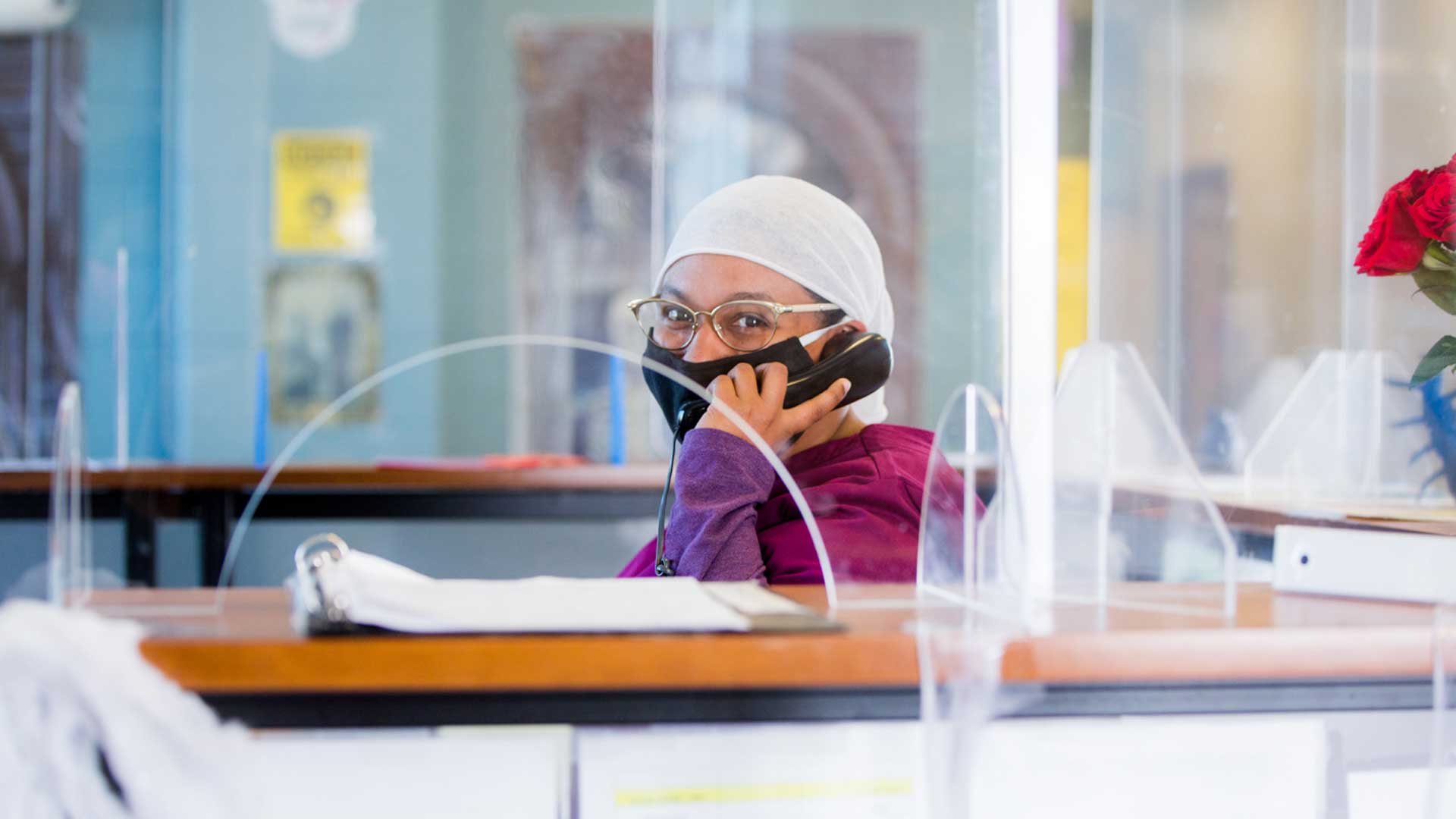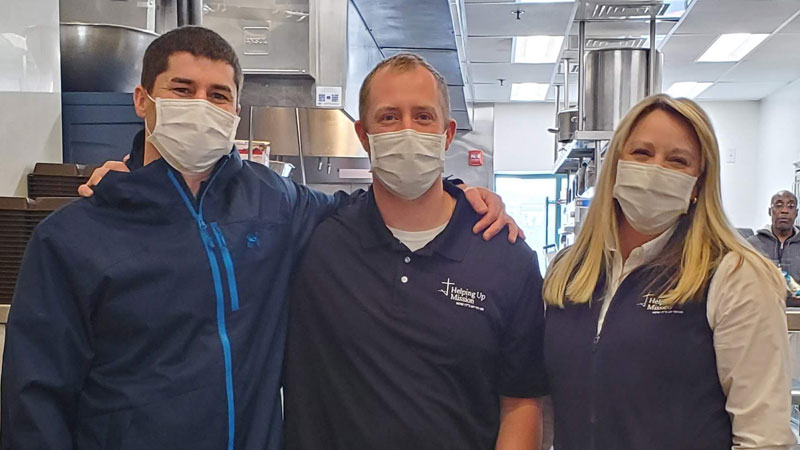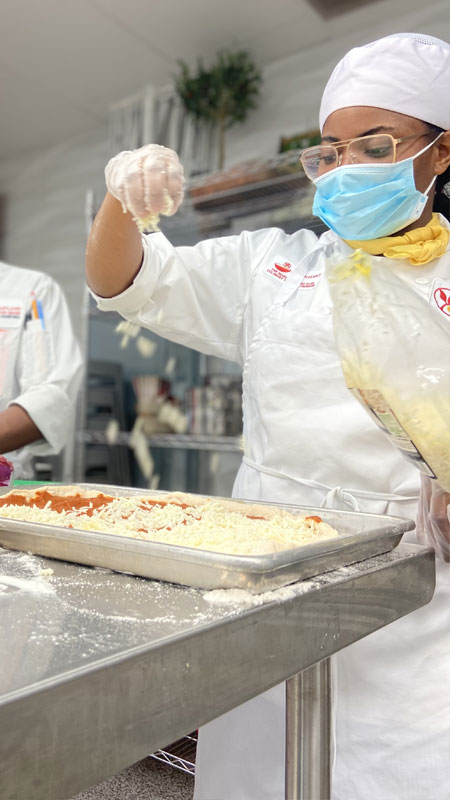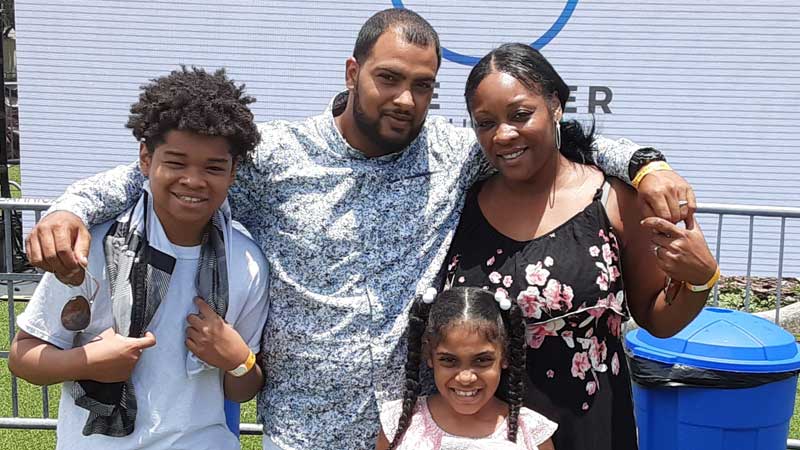Holistic Help for Hunger’s Root Causes

Over the course of the pandemic, the food bank distributed a historic amount of food — enough to provide nearly 62 million meals alone in FY21. And while that certainly helped many Maryland families get through one of the toughest times in recent memory, we fully recognize that food alone will not solve hunger. We need to do more for our neighbors in need.
Our research shows that economic instability is a root cause of food insecurity. That’s why a key part of MFB 3.0, our refreshed strategic plan, emphasizes expanding workforce development programs and partnerships that are crucial to not only Maryland’s continued recovery, but its long-term ability to thrive.
Some of our Network Partners — including three that you’ll read about here — are already offering these wraparound services. Our Regional Program Directors are working every day to help more of our statewide partners form these kinds of beneficial relationships.

For its first 80 years in operation, Helping Up Mission (HUM) served solely as an emergency shelter in East Baltimore. But it has greatly expanded its services and now combines food with “work therapy” (also known as workforce development) to help individuals get back on the path to independence and stability.
Since 2004, the Maryland Food Bank has been HUM’s primary food supplier. We provide monthly deliveries of produce and shelf-stable foods, as well as recipes and educational materials, to a kitchen that is both a source of sustenance and education. Every day, a rotating roster of enrollees prepares 1,200 meals for HUM guests, offering people the chance to develop healthy eating habits while learning employable job skills.
After graduating from Rider College, Michael Cannon planned to use his marketing degree to start a career, but in trying to keep up with the hectic work schedule he became addicted to drugs.
Michael came to Helping Up Mission in 2017 looking to change the trajectory of his life. His work therapy in the kitchen gave him valuable insight into how food could be a conduit for change.
“I really wanted to change not only my mind, but my body as well and having healthy food easily available is really important.”
The additional support services Michael received led him full circle professionally, to an unexpected place — HUM’s Philanthropy department, where Michael has worked as the organization’s Philanthropy Specialist since October 2020.
“Now, I get to see the work I do have a direct impact on others, which makes it rewarding,” he said.

Since 1965, the Community Assistance Network (CAN) has sought to “develop, operate, and support programs that reduce vulnerability and promote personal growth, stability, and self-sufficiency among low-income residents.” For nearly a decade, the Maryland Food Bank has played an important role in this effort by supplying nutritious food to their pantry.
And while CAN’s food pantry has been a valuable resource for Baltimore County families, the organization offers a number of additional wraparound services designed to assist neighbors struggling to afford both food and their bills. Programs include financial counseling and after-school initiatives, but one of CAN’s most effective programs is eviction protection.
Teara Jackson, a Community Resource Specialist on CAN’s Outreach Team, once sought help extricating herself from a tough situation. Five years ago, Teara’s husband’s struggles with addiction led to the Jacksons losing their house and going their separate ways. Teara, who was still working, became the sole provider and parent to her four young children.
Through the chaotic transition, she was able to keep working, but encountered difficulty finding housing for her family, affording food, and keeping the kids engaged.
Teara was referred to CAN, which was able to provide nutritious food to feed her family, help her sort out her finances (which allowed her to return to home ownership), and offer her kids assistance with homework and activities through their after-school programs.
“When I got into my house, I actually started working at another nonprofit — I mean, what better way to give back than to help others? But I kept in contact with some of the people at CAN that were life-impacting to me, and when one of them told me CAN was hiring for a job that they thought I would be really good for, I quickly applied, and I’ve been here for three years now!”
While she admits that it can sometimes be difficult to hear the stories of the people who call in for assistance, Teara’s personal experiences make her the perfect person to lend an empathetic ear and help make the right connections.
“Working in the food pantry is a little different than when I am on the phone with people,” she said. “People are usually really stressed when they call, but then when they come in, they feel at ease and it’s easier to talk to them about other services we provide that can help with their underlying issues, like budget counseling.”
“All of our conversations begin with food, but quickly turn to what the real, underlying issues are people are struggling with, which we find are primarily a lack of education and employment. N8 House can help satisfy these needs.”
Operating under the belief that stronger families create stronger communities, N8 House’s mission is “to change the lives of families affected by poverty through personal responsibility.” The northeast Baltimore organization’s primary catalyst for change is their Purple Workboot program, which N8 House Director Dawn Glover sees as the path to stability.
“We’ve found that participants who obtain a GED, trade, or college education have been able to gain long-term employment and maintain long-term housing, creating stability for themselves and their families,” she said. “Upon completion of an education program, we help participants find viable employment opportunities through our partnerships.”
And while the Purple Workboot program is successfully helping families achieve long-term stability, N8 House has additional resources and relationships that can address more immediate issues, like job loss and evictions.
Just prior to the holidays, N8 House’s wraparound services made all the difference to Shawnda and Ahmed Aladimi and their two children, whose lives were thrown into chaos during the pandemic.

“We were evicted from our apartment with nowhere to go, and no money to assist with the moving to another location. We called N8 House, and Dawn was there in 20 minutes, ready to help us with our belongings that were literally in the parking lot.”
N8 House’s partnership with the Maryland Food Bank meant that the Aladimis did not have to worry as much about stocking their fridge each week or enjoying a holiday meal together, and the organization’s local relationships led to short-term employment and season-brightening gifts for the children.
“Now, we have secure employment — I am a social worker, and my husband is in construction — and we have a home to call our own,” Shawnda said. “Our children are on the honor roll, and I can honestly say I don’t know where we’d be without N8 House.”
From MFB’s perspective, helping more Marylanders address the underlying issues that lead to needing food assistance is one of the clearest paths to lifting up our entire state.
“Connecting our Network Partners with service providers to help manage the root causes that lead Marylanders into food insecurity is a primary focus for us in 2022 and beyond,” said Nekeisia Booyer, MFB’s Senior Vice President of Programs.
Guided by MFB 3.0 and our 43 years of experience and expertise, we will help our community partners form more service partnerships, allowing more Maryland families break free of the stubborn, cyclical grip of hunger.
Get updates on our progress in the fight against hunger
Want to see how your involvement directly impacts the well-being of your neighbors in need? Get the latest news sent to your inbox.







